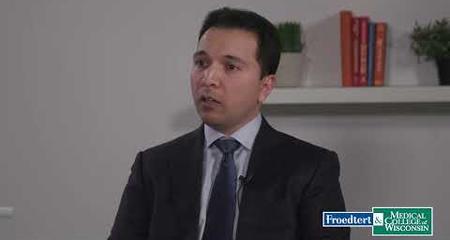Amyloidosis describes a group of diseases caused by deposits of amyloid fibrils in the body’s organs. Amyloid fibrils are normal proteins that undergo changes and fold into slender fibers. The build-up of these inflexible protein fibers can ultimately lead to organ decline.
Cardiac amyloidosis is when amyloid fibrils are deposited in the heart. The fibrils make it difficult for the heart to expand and contract. This limits the heart's ability to pump and circulate blood effectively. You may hear the condition referred to as "stiff heart" due to the reduced elasticity of the heart muscle.
There are different types of amyloidosis, which can affect the heart, lungs, kidneys, skin, eyes, digestive tract and nervous system. Those most commonly affecting the heart include light-chain amyloidosis (AL amyloidosis) and transthyretin amyloidosis (ATTR). AL is the most common type of amyloidosis in the U.S. and is caused by abnormal plasma cells. ATTR amyloidosis can be the result of a hereditary gene mutation or can occur sporadically.
What Are the Symptoms of Cardiac Amyloidosis?
Common symptoms of cardiac amyloidosis can include:
- Abnormal heart rhythm (arrhythmia, such as atrial fibrillation or AFib)
- Chest pain
- Fatigue
- Shortness of breath
The amyloid fibrils can also deposit in other organ systems which can result in noncardiac symptoms such as:
- Bladder and bowel issues
- Decreased appetite
- Feeling light headed
- Limb numbness or tingling
- Nausea
- Sexual dysfunction
- Weight loss
Risk Factors and Diagnosis
Cardiac amyloidosis is considered rare, but rates are rising as we improve diagnostic techniques. It is associated with certain other conditions. Patients with multiple myeloma or monoclonal gammopathy of unknown significance (MGUS) may have increased risk of developing AL amyloidosis. Family history of hereditary ATTR amyloidosis can also increase the risk, as it is a genetic condition.
If you were diagnosed with amyloidosis in other organs or systems — such as the kidneys or nervous system, you are at risk of the same proteins depositing in your heart. You are also at a higher risk of developing cardiac amyloidosis if you are:
- Male
- Over the age of 50
Cardiac amyloidosis tests for the protein buildup in the heart tissue, as well as its effect on the body. Diagnosis methods may include:
- Blood tests, and sometimes urine tests, to look for stress in the heart
- Bone marrow biopsy or bone scans to check for abnormal plasma cell production
- Genetic screening if you have a family history
- Heart tissue biopsy
- Imaging such as an echocardiogram, cardiac MRI or nuclear imaging scan
Treatment and Life Expectancy
While there is no cure for cardiac amyloidosis, we can successfully delay or stop the progression of the disease. Early diagnosis is one of the keys to success, made possible by recent advances in diagnostic techniques.
Average life expectancy varies based on the type of cardiac amyloid (protein), how much the organs are involved and the stage at diagnosis. Based on these factors, the worst case scenario could be six months, while in some cases, life expectancy can be eight to 10 years after diagnosis. It is important to emphasize that these are general statistics; every person is an individual and may have varying outcomes.
Cardiac amyloidosis is treated based on the type of protein that is making up the amyloid fibrils. AL amyloidosis is commonly treated with chemotherapy. ATTR amyloidosis can be treated with agents designed to stabilize the TTR protein or decrease production of the protein. Our team treats heart symptoms based on therapies to alleviate the symptoms.
Our team is working to improve the long-term prognosis for cardiac amyloidosis. We have access to and are involved in clinical trials of medications that reverse the deposit of amyloid fibrils in the heart. We are also involved in trials of new therapies that suppress fibril formation.
Cardiac Specialists With Years of Experience
Within the Froedtert & MCW health network, our dedicated team specializes in diagnosing and treating cardiac and other types of amyloidosis. You also have access to specialists experienced in treating related symptoms involving your nervous system, kidneys, digestive system or eyes.
The Society for Vascular Surgery's Vascular Quality Initiative (SVS VQI) has awarded Froedtert Hospital three out of three stars for its active participation in the Registry Participation Program. The mission of the SVS VQI is to improve patient safety and the quality of vascular care delivery by providing web-based collection, aggregation and analysis of clinical data submitted in registry format for all patients undergoing specific vascular treatments. The VQI operates 14 vascular registries.
Blogs, Patient Stories, Videos and Classes





